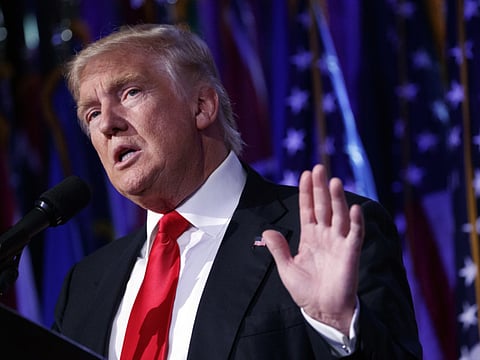An intriguing foreign-policy template
The new US president may be interested in a strategy of dual containment of Ankara and Tehran — in coordination with Russia

With Donald Trump in the White House and Republicans a majority in the House and Senate, United States has got an executive and legislature of one colour to make policy formulation and implementaion easier. A Republican president, who’s not actually that much of a ‘Republican’ — he didn’t win because of his party’s support — and a Congress controlled by ‘traditional’ Republicans, should help in shaping an American position internally and in the wider world. Conventional wisdom says that the ‘bureaucratic’ apparatus of the administration is the main policy-shaper and executioner. Yet, the president’s personality and beliefs still play a role (and let’s say also influenced by his non-civil service advisers). So, a Trump era is starting for Americans and the world in general and we all should be prepared for it.
I have written in these pages before that the Middle East, and Arabs in particular, didn’t realise that the US was shifting its policy in the region and the world since the second term of former US president George W. Bush. We were blaming President Barack Obama and his administration for lack of active involvement in regional issues, still believing in the old way and not perceiving well the policy-shift. Now, we’ll have to ‘get it’ the hard way, as President-elect Trump is very clear on this.
First, his priorities are domestic: Security, Jobs and health care — as he said after visiting the Congress as President-elect. Actually, American people who voted for him and not his rival, Democrat Hillary Clinton, care more about domestic issues than about foreign policy. Although this is generally the case with almost majority of the countries and not just America, this time around, though, it’s the more inward interests than outward concerns about the world far and beyond that have had a greater impact on the US election. Thus, Mexico and Canada will be more important to Americans than Afghanistan and Iraq.
This doesn’t necessarily mean that a Trump administration will sharply shift towards an ‘isolationist’ policy. Yet, it’s clear from the first interview Trump gave after his win that his foreign policy is going to be conservative, favouring stability rather than change. The Bottomline is that political stability guarantees better security, so his foreign policy on the Middle East will probably be against ‘Arab Spring’ and for ensuring status quo. According to the Wall Street Journal (WSJ), which conducted the interview a few days after the election, Trump suggested a shift away from what he said was the current Obama administration’s policy of attempting to find moderate Syrian opposition groups to support in the civil war there. “I’ve had an opposite view to that of many people regarding Syria”, Trump said. He suggested a sharper focus on fighting Daesh (the self-proclaimed Islamic State of Iraq and the Levant) in Syria, rather than ousting Syrian President Bashar Al Assad. “My attitude was you’re fighting Syria, Syria is fighting [Daesh] and you have to get rid of [Daesh]. Russia is now totally aligned with Syria and now you have Iran, which is becoming powerful, because of us, is [now] aligned with Syria ... Now we’re backing rebels against Syria and we have no idea who these people are.” If the US attacks Al Assad, Trump said in his WSJ interview, “we end up fighting Russia, fighting Syria”.
Contrary to that, the trump administration will not go soft on Iran — traditionally, Republican’s distrust the Iranians as they keep meddling in other countries’ affairs. Thus, they’re pro-change not pro-stability. Again, the nuclear deal with Iran may not be scrapped by President Trump, but a different approach towards Tehran, in contrast to Obama’s, is likely to follow. The policy of containment may be back, with tightening of existing American sanctions on the Iranian regime. At the same time, Turkey’s heydays may be over and dual containment of both Ankara and Tehran may be possible — in coordination with Russia!
The ultimate beneficiary of American policy under Trump will be Israel, as it already has plans to expand colonies in Occupied Territories and practically renouncing the internationally-accepted two-state solution to resolve the Palestine-Israel crisis.
Keeping rhetoric aside, the trump era will mark another phase in the disengagement strategy that Washington had adopted more than a decade ago. There is anticipation for a more conservative foreign policy, almost totally opposite to that adopted by the newcon arm of the Republicans in former president George W. Bush’s days.
All that is in line with a more inward-looking foreign policy rather than seeking active involvement in the world and the Middle East in particular. One likely scenario is ‘no more American wars’ for now — not even in support of allies anywhere. Are we getting it now?! Not quite sure.
Dr Ahmed Mustafa is an Abu Dhabi-based journalist.
Sign up for the Daily Briefing
Get the latest news and updates straight to your inbox


